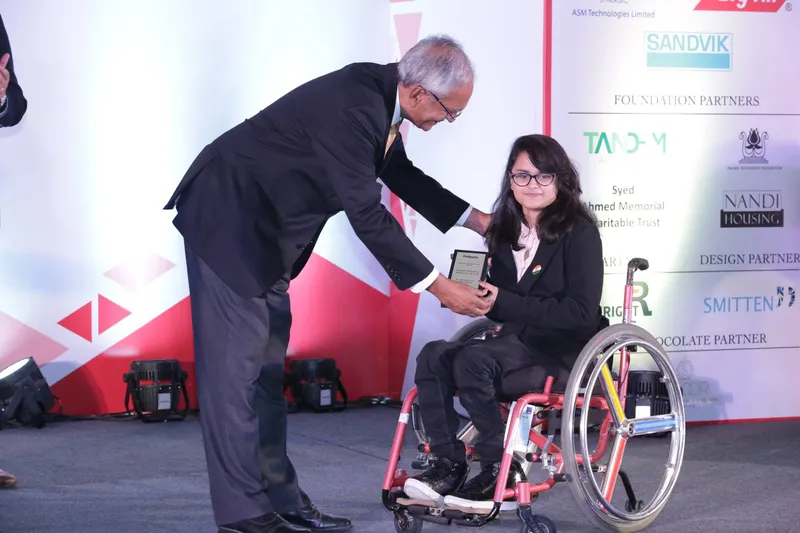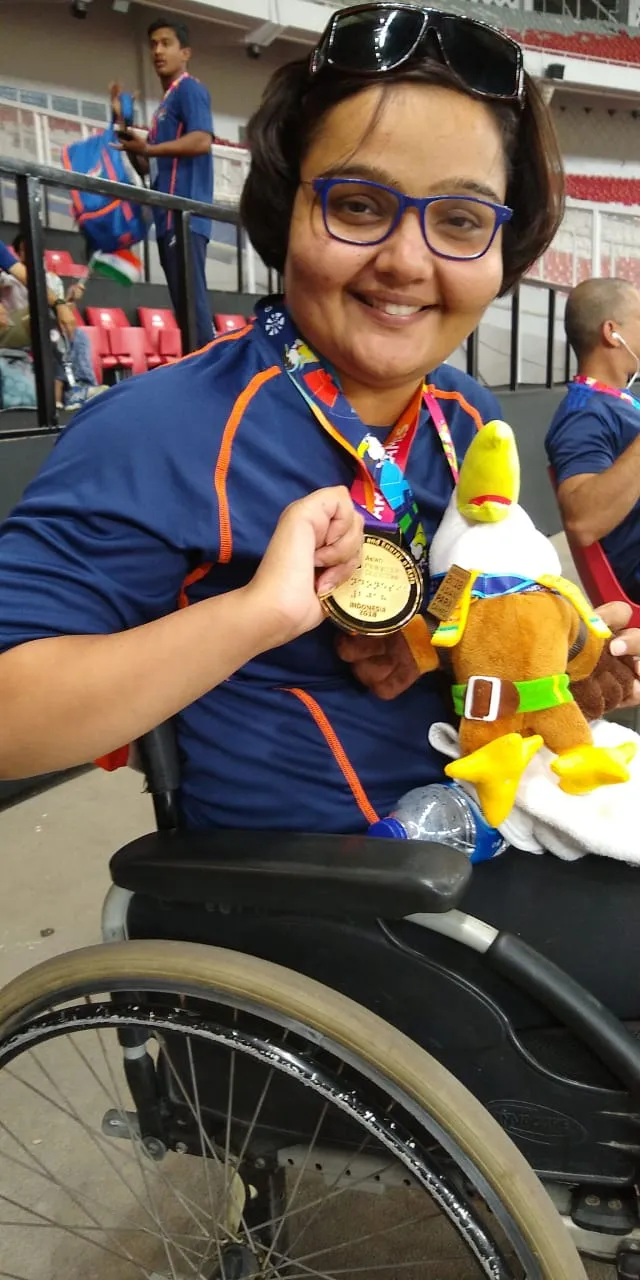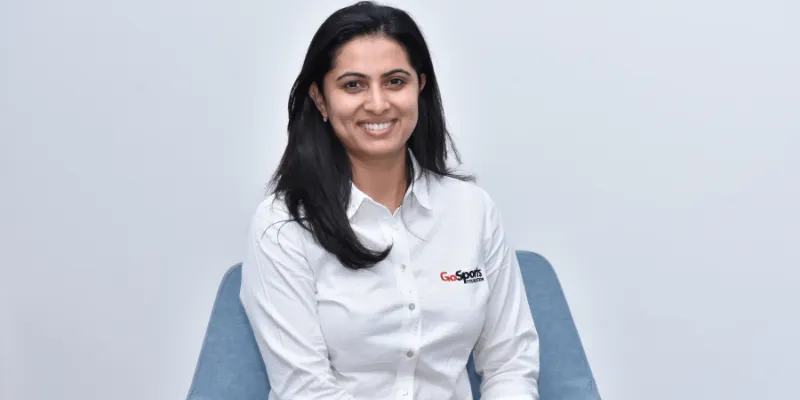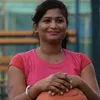Surmounting the odds: How Paralympians Avani Lekhara and Ekta Bhyan rose above disability to become champions
HerStory speaks to Paralympians Avani Lekhara and Ekta Bhyan on India’s historic wins at the Tokyo Paralympics, their journeys as para-athletes, and why we need better infrastructure and facilities for the disabled.
It was an unforgettable dream run for India as it won 19 medals at the Tokyo Paralympics this year. The best showing before this was a mere four medals. And despite the pandemic and its challenges, para-athletes registered historic feats and became the nation’s pride and joy.
For most of them, it was not just the victory alone; it was also a mantle to be taken seriously. They advocate for more accessibility and infrastructure for the disabled and society to be inclusive and empathetic to their needs.
The spirited contingent included Avani Lekhara and Ekta Bhyan, who have proved that while rising above disability may be challenging, hard work and the right attitude always triumph.
While Ekta did not win a medal, she carried a feeling of victory as India posted a formidable medals haul. Nineteen-year-old Avani became the first woman to win two Paralympic medals by winning a gold and bronze in rifle shooting.
HerStory spoke to Avani and Ekta about their experiences at the Paralympics and how it felt to be part of a winning contingent and advocate for inclusivity and more women in para-sports.
We also spoke with Deepthi Bopaiah, CEO, GoSports Foundation, an award-winning national non-profit that works towards developing some of India’s talented, emerging, and elite athletes, competing across Olympic and Paralympic disciplines through athlete scholarships and knowledge-building programmes.
Avani Lekhara

Avani Lekhara receiving an award
In 2019, when Avani Lekhara was participating in the World Cup in the UAE and playing for the Paralympics quota, she could not make it to the finals in three matches. In the fourth and last game, she came seventh in the qualification round. She was very nervous.
“This was my last chance, and it was not even my main event. I went in there, gave my 100 percent with full focus and came first, winning a berth in the Tokyo Paralympics,” she recalls.
To be held in 2020, the Paralympics were postponed due to the pandemic. Avani says she was highly disheartened but not prepared to give up. The training was a massive challenge as shooting ranges were shut during the lockdown.
Avani got a digital target setup installed in her home. “So basically, I was shooting from my kitchen to my master bedroom,” she says with a laugh, adding, “All my training sessions were online; only my physiotherapist would visit me at home. The good thing was I got a year to train.”
Avani met with an accident in 2012, following which she was paralysed below her waist and lost all motor power and sensations. “I was on bed rest for seven months. I went to school for two years and later was homeschooled. I became an introvert, and my parents suggested I try out some sport,” she says.
During the summer holidays, Avani joined a shooting and archery range close to her home. While she did not have the physical strength for archery, she managed the 5kg rifle and said shooting chose her immediately.
But there were some hurdles; she did not have proper equipment or the know-how of the rules and regulations of the game. She hired a coach and won a gold in the first-ever match she participated in, where she competed with able-bodied athletes. More wins followed, three golds for Rajasthan at the National Games in 2017, at the World Cup in the UAE in 2017, after which she partnered with GoSports Foundation to take her career forward. She also moved from a rented rifle to proper equipment.
The reception in India after her return from Tokyo “has been surreal”. The athletes interacted with Prime Minister Modi, and Avani has also been made ambassador of the government’s Beti Bachao, Beti Padhao campaign.
“I will try to spread more awareness about the need for girls to study at the grassroots level, especially in villages,” she says.
Juggling sport with an intensive five-year law degree, Avani says everything’s possible because of the support of her friends, her friends, and her educational institution.
“There should be better infrastructure for the disabled in India – like ramps on public transport, accessibility to washrooms, and more to provide them accessibility,” she adds.
Avani is now looking forward to the Asian Games in 2022, the World Championships, and qualifying for the 2024 Paralympics.
Ekta Bhyan

Ekta Bhyan
After training hard for four years, Ekta Bhyan was a medal prospect for India at the Paralympics. But she failed to win a medal.
“It was very disappointing, and all my hard work went down the drain. But I believe we should always learn from our mistakes and look forward,” she says.
Ekta is happy that after India’s spectacular performance in Tokyo, para-athletes are now getting the recognition they deserve.
A road accident in 2003 that led to a spinal injury led to complete paralysis of her lower limbs and partial paralysis of her upper limbs. She was just 18.
“I had dreamt of becoming a doctor, and after the accident, my whole life underwent a drastic change. Life changed completely. I spent nine months in the hospital and underwent three surgeries,” she says.
After she returned home, Ekta says she realised she was a different person. There was a change in society’s perception of her and her disability. She was considered a burden on her family.
She started studying, and that boosted her confidence. In 2013, Ekta cracked the Haryana Civil Services Exam and joined the Haryana government as Assistant Employment Officer in Hisar.
Media reports about her achievement reached Paralympian Amit Kumar Saroha, who encouraged her to try the para-sport and introduced her to club throw. In 2016, Ekta started competing in major tournaments. She won the silver at the Athletics Grand Prix in Berlin and, in 2018, won gold at the Asian Para Games.
Though initially hesitant to take up para-sports because of its burden on others, Ekta's support from the government and the GoSports Foundation has allowed her to dream big.
However, she believes India still has a long way to go for inclusivity for the disabled.
“Assistive devices like artificial limbs or a good quality wheelchair are costly. Due to faulty infrastructure, the disabled don’t have many opportunities to pursue a career. Employment is also hard to come by. Most of us are also dependent on others to move from one place to another,” she points out.
The international recognition, she believes, will help more para-athletes come to the fore. But there is also a greater need to create more infrastructure and also raise awareness.
“We also need to break the mental barriers surrounding the disabled. Give them more opportunities,” she adds.
Ekta signs off with her favourite quote. “’Life is not in our hands but living is’. You may face any kind of situation you may not be prepared for. But the best thing we can do to make our situation better is to work hard and with the right attitude.”
Deepthi Bopaiah

Deepthi’s association with GoSports Foundation began in 2012. A tennis and basketball player at the state and university level, she worked in the banking sector before joining GoSports Foundation in 2012 to follow her passion for sport and create a meaningful impact on India’s sporting ecosystem.
Deepthi has worked with more than 200 Indian athletes across Olympic and Paralympic disciplines whilst being a part of the journeys of around 50 Olympians and Paralympians, not to mention 10 Paralympic medallists as well.
“Behind the success of every athlete, there is an entourage that does everything possible to provide the platform for the athlete to succeed. The Foundation’s support structure for the athletes, across all programmes, constantly adopts the latest innovations in the sporting world, to provide a platform where talent can meet opportunity,” she says.
Over the years, GoSports has supported athletes on various aspects of their development, including designing and curating a support structure for each athlete individually, especially understanding their needs.
These comprise impact sports training, physical assessments, physiotherapy, strength and conditioning, mental conditioning, nutritional counselling, and injury management and rehabilitation; competition expenses including travel, accommodation, insurance, and tournament entry fees; sports apparel and equipment; athlete education and development; career management guidance, and support; and legal support.
“Aligning and contributing towards various international programmes and movements such as the Sustainable Development Goals and the #WeThe15 Movement is a huge objective for GoSports Foundation, as these aim to create a more inclusive world, bring to the fore more opportunities for people with disabilities, and change the attitudes and perceptions of the public,” Deepthi says.
Edited by Teja Lele








